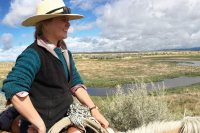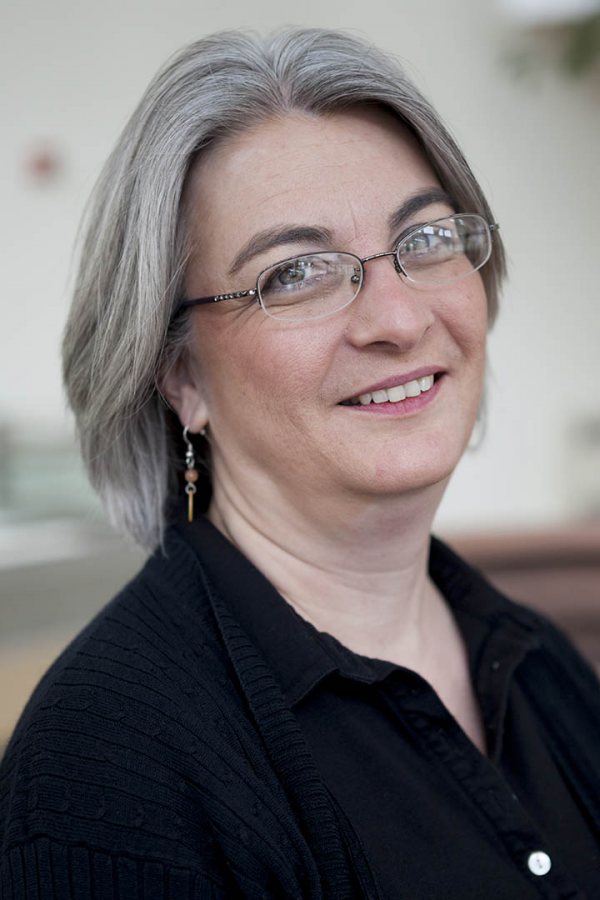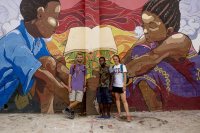
Lecturer in education receives Fulbright for research in India
Having both a longstanding interest in India and a winter 2016 sabbatical on the horizon, Anita Charles was thinking hard about a way to mesh the interest with the opportunity.
A lecturer on the education faculty and the director of secondary teacher education at Bates, Charles wanted to learn more about two aspects of childhood education in India. First, policies and practices pertaining to children with special needs; second, the role of digital technology, particularly how it aligns with literacy education.
She’ll get that chance next year after receiving a
Fulbright–Nehru Academic and Professional Excellence Award, which will allow her to work in India from January to April 2016.
Here’s how the award came about. As Charles was pondering her sabbatical options, she met a professor of education from India who was working at Maine’s Thomas College as a Fulbright Scholar. Deepika Papneja, an assistant professor of education at Lady Shri Ram College for Women in New Delhi, was a scholar in residence at Thomas from 2013 to 2014.
“It was as if the stars aligned,” Charles says. “We talked about her experience, what she was doing, and where she was from.” Soon thereafter, when Charles learned of a Fulbright scholarship opportunity from Bates’ external grants office (aka the Office of Sponsored Programs and Research Compliance), Papneja agreed to arrange a letter of invitation from Lady Shri Ram in support of Charles’ Fulbright application.
“The process happened very quickly, from meeting Deepika, to learning about the Fulbright options, to applying,” Charles says. The application was approved and she received a Fulbright–Nehru Academic and Professional Excellence Award. (Read more about Fulbright grants awarded to Bates people in 2015).
Charles will teach courses in education, child development, and language acquisition at Lady Shri Ram, a unit of the University of Delhi. This first-hand experience with Indian approaches to elementary education, she hopes, will add a cross-cultural dimension to her understanding of literacy and special education.
“They’re interested in possible curriculum development that I might be able to lend my expertise toward,” Charles notes. “And they’ve mentioned my participating in interdisciplinary forums, seminars, and local outreach programs.”
When Charles came to Bates in 2004, she brought classroom teaching experience ranging from first grade to adult education, and including 10 years of teaching high school English. In India, she says, “I’m eager to do observations and get some sense of how India approaches public education. And I’ll be working with students who are going into teaching field, so I’m looking at what they’re doing.
‘It’s going to be really exciting to just embed myself in India’s culture and learn about their educational structures.’
“I go in with no preconceived ideas, other than the fact that I believe that they commit, in many ways, to some things that we do in this country — in terms of wanting to incorporate technology and wanting to have policies that benefit special-needs kids.”
But Charles’ interest in India is personal as well as professional. She and her husband, Chris Gelder, adopted three of their five children from India, and two of the three —daughters Devki Gelder, 16, and Malvika Gelder, 14 — will accompany Charles on her sabbatical in the land of their birth.
“I hope that it brings them a new understanding of their own cultural heritage,” she says.
Charles is especially excited about working at a women’s college in India, a nation with attitudes about gender that are quite different from those in the U.S. “I would like to believe that Lady Shri Ram is an environment of empowerment for women — for their voices, for their presence, for their education, for their futures.”
Charles says, “I expect a lot of the experience to be a challenge, in a very good sense of the word. I think it will push me beyond my comfort zone, and give me a new lens through which to look at Indian education as well as to look at our own education systems in this country.
“It’s going to be really exciting to just embed myself in the culture and learn about their educational structures.”
Charles has a bachelor’s degree in French and education from Dartmouth College, and a master’s in education in human development and psychology, with a focus on language and culture, from Harvard. She earned a doctorate from the University of New Hampshire in the area of adolescent literacy.





